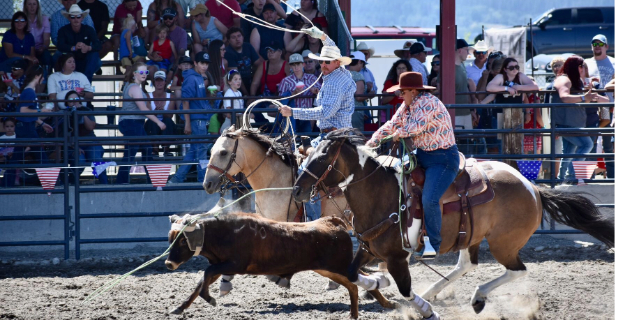On the Road Again
Published 3:00 am Wednesday, June 28, 2023

- Victory Acre Farms, on Fruitdale Lane, is a full-service riding academy.
Let’s take a historical tour of Fruitdale Lane, a 2.24-mile-long road with several sharp turns midway. It runs east and west with Hunter Road/N. McAlister Road on its east end and Mt. Glen Road/Spruce Street on its west end. In between these book ends rest stories about education, enterprise, entertainment and elder care.
Fruitdale originally described a fertile region planted in orchards. A principal part of this region was owned by homesteader Jacob Nessly, later dubbed “the original nursery man of the Grande Ronde Valley.”
Nessly arrived in the valley in 1862, and started developing his orchards, including a fine lot of pears and peach plums, the first of its kind in the valley. He did a lot of grafting onto wild trees and later developed the “Lucinda” apple named after his daughter.
Later, other enterprising orchardists bought land in Fruitdale — S. J. White, L. Oldenburg, W. M. Hall, A. Bedin, Thomas Walsh, Bishop Jordon, Mr. Bougards and many others. The land was so fruitful in Fruitdale that it sold for $300 per acre in 1901. The yields were often shipped to Eastern markets at very satisfactory prices. The apple specimens grown in Fruitdale included Gano, Lucinda, Mammoth, Black Twig, Shackelford and Big Red apples.
No doubt a Big Red apple ended up on the desks of teachers at Fruitdale School, located on the southeast corner of Gaertner Lane and Mount Glen Road. School District No. 27 was known as Fruitdale School since at least 1882, and it closed on September 30, 1960, after which students were bussed to Greenwood School.
Understandably, Fruitdale generated a lot of its own news, so the newspaper covered their news in a column titled “Fruitdale Findings,” which often mentioned the apple harvests and orchard news.
The newspaper also covered big Fruitdale news in 1909 under the title “County Court Buys Poor Farm near Island City.” For $6,600 the county bought the Charlie Green 40-acre tract of land one quarter mile west of Hunter Road on Fruitdale Lane. The property had a six-room house, two wells, a barn, 10 acres in orchard, a field with a full crop of grain on it, 20 tons of hay, horses and farm implements valued at $500. Historically, this was Union County’s second poor farm on record.
The first poor farm was purchased for $1,700 and operated from 1888 to 1909 in Union. The second poor farm on the Fruitdale property was operative from 1909 to the 1940s, and both institutes provided housing for seriously injured people, who could not support themselves.
Today, there are several entertainment sites on Fruitdale Lane, including Victory Acres Farm, 62611 Fruitdale Lane, a full-service riding academy and boarding facility, and Riverside Greens, 62102 Fruitdale Lane, a miniature golf course.
If you need to board your pet dog, check out Countryside Kennels, 62616 Fruitdale Lane.
Of course, Fruitdale Lane is home to the 12-acre Riverside Park, purchased in 1909 and laid out in 1910. The historic pavilion was built between June 1913 and July 1914, but on Saturday, February 12, 2011, the 97-year-old pavilion went up in flames. It was rebuilt and officially reopened at a ribbon-cutting ceremony and breakfast on Sunday, June 3, 2012. To book your event there, visit the city’s website.
Lastly, just off Fruitdale Lane is the Evergreen Family Farm, 62402 Evergreen Road. This farm is part of the Grande Ronde Farm Trail, and it offers a crop-sharing program, where people can subscribe to a box of fresh farm produce every week all summer long. Owners Sara Fischer and her husband Nik Hackney operate it and welcome visitors.









